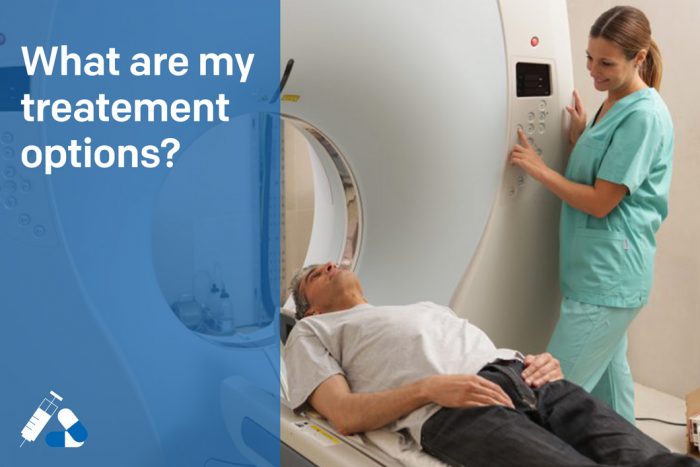Under 70 years old
Men in their fifties or sixties are more likely to die from prostate cancer than older men because the disease has more time to evolve or reappear. It is therefore very important to treat the cancer as soon as possible. In general, when the prostate cancer is localized, the most effective treatments are radical prostatectomy or radiation therapy. In both cases, the cure rate is very high.
When the prostate cancer is locally advanced, a combination of treatment is usually recommended. Locally advanced cancer refers to: (1) an aggressive local tumour (High Gleason score), (2) high PSA levels or (3) a tumour that seems to extend beyond the prostate. The recommended treatments are radical prostatectomy, radiation therapy, hormonal therapy or a combination of two or all three of these therapies. This combination treatment can lead to greater chances of cure. The health status of the patient may also influence the choice of treatment. Indeed, men suffering from a severe illness in addition to the prostate cancer may not be able to withstand major surgery such as radical prostatectomy. Therefore, if the cancer is not aggressive, active surveillance is recommended. In the case of a more aggressive tumour, the physician rather suggests radiation therapy and/or hormonal therapy. One of the benefits of radiation therapy is that it is suitable for all patients, regardless of their state of health. However, this treatment has a significant drawback: it limits the treatment options in case of recurrence. Indeed, after a radiation treatment, it is no longer possible to resort to radical prostatectomy. Specifically, radiation burns prostate tissue making it difficult to remove the prostate thereafter without causing serious consequences. Radical prostatectomy, in turn, allows a greater possibility of treatment in case of recurrence. Therefore, it is possible to use radiation therapy or other types of treatment after the radical prostatectomy. Since the risk of recurrence is higher for younger patients it explains why the most recommended treatment is surgery.
Older than 70 years old
The death rate associated with prostate cancer is lower in men who are 70 years and older compared to younger patients. Indeed, younger men have a higher risk of recurrence because they have more time in front of them while older men are more likely to be affected by another disease. The treatment generally recommended for patients over 70 with slow-growing localized cancer is active surveillance. The progression of the disease can be so slow that the disadvantages and side effects of the treatment are likely to outweigh the symptoms of the cancer itself. Thus, when a patient’s life expectancy is less than 10 years and the level of aggressiveness of his cancer seems low, doctors often choose to wait in order to avoid subjecting him to painful treatments. If the disease starts to progress more quickly, hormonal therapy will help to slow the progression of the disease and alleviate symptoms. This type of treatment may be sufficient in some cases. If the cancer is still at an early stage but begins to spread beyond the prostate, doctors opt for radiation therapy or a combination of this treatment with hormonal therapy. In some cases, when the tumour is aggressive and the patient has a good health and life expectancy doctors can resort to radical prostatectomy. For more details on the various prostate cancer treatments, see the Treatments section. You have questions? Speak to one of our health professionals. Contact our toll-free 24/7 line at 1 855 899 – 2873



 ADDITIONAL RESOURCES
ADDITIONAL RESOURCES

